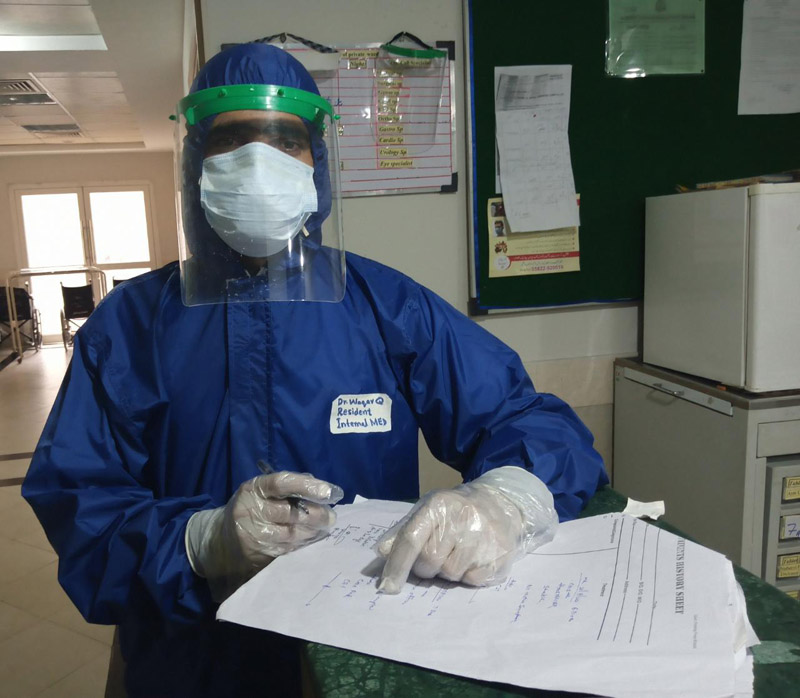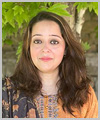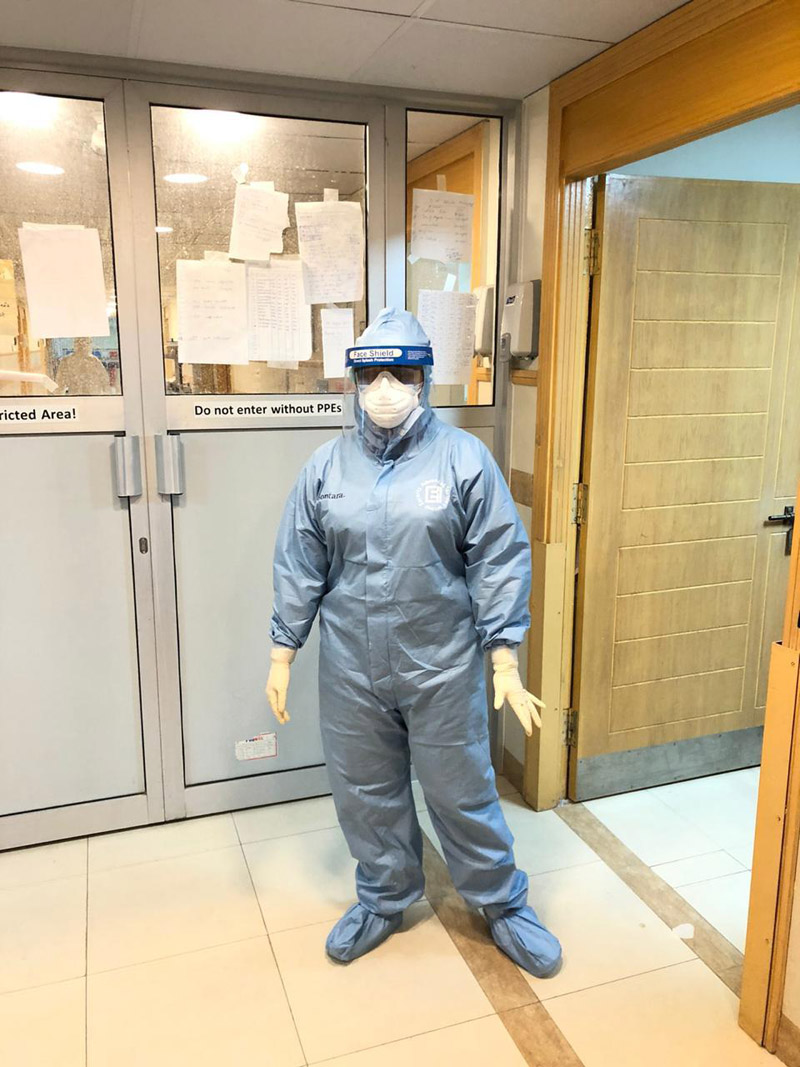This is the story of a doctor who, along with her sister, rose to the occasion; Put herself in the line of fire and bravely confronted the challenges posed by the Covid-19 pandemic. Both of them have been helping out the needy people since the last 5-months. On the request of CPDR, Dr. Hadia Aziz shared her personal reflections which is presented here for our readers. Editor.

I was stuck in the middle of a vast traffic jam on the Azad Pattan Bridge which separates AJ&K from Punjab in the last week of March this year. We were not being allowed to cross the bridge owing to the complete ban on entry into the state of AJK. COVID-19 disease was wreaking havoc all over the world and we were also embarking on the measures, no matter how extreme and out of the ordinary they appeared, to combat this lethal and unforeseen pandemic.
I was visiting my family over the weekend and that was the exact time when this lockdown was enforced. We waited for 6 hours before we were allowed to cross the bridge. I witnessed and experienced something extraordinary that day. People were coming to Azad Pattan on vehicles and by foot. I saw those daily wagers crossing the bridge and surrounding hills by foot. They were hell bent on reaching their homes. Many of them were laid off by their employers and they didn’t have enough money for the fare back home.
I remember when the world was being slowly swamped by this pandemic; we were still in a state of denial and relative tranquillity. It was not because of the preparedness of our system to deal with this crisis but because of the fact that we didn’t possibly believe that something this catastrophic could ever capsize our whole existence. As a healthcare provider, like most of my peers, I was also alarmed by the frightening set of possibilities this pandemic was anticipated to bring into our lives. We were very scared as to how our whole lives would change completely as feared at the time and how difficult would it be for us to continue the patient care. We were being prepared by our hospitals and the World Health Organisation for this apparently bleak future- a future that necessitated losing connection with our loved ones, a future that led to the deprivation of contact with our patients. We were not being able to examine directly many of our patients, leading to the loss of patient-doctor connection, hence the compassion.
| Being a doctor, the event that shook me to the core was the Shahadat of Dr. Usama Riaz in Gilgit-Baltistan who was the first victim amongst countless healthcare providers who laid their lives in this war against COVID-19. I had a feeling of personal loss when his death was confirmed on March 22nd, 2020. There was fear of loss of lives of many more doctors and paramedics in Pakistan owing to the lack of personal protective equipment and necessary facilities. |
I saw an unprecedented response by the healthcare workers all over the world especially in Pakistan considering the constraints in the resources and amenities. I vividly remember a workshop in which a personnel from the WHO told us to save our masks for future which was bound to be desolate since they were expecting a dire shortfall of PPE (personal protective equipment). I was astonished at their callous but shrewd assessment of ensuing affairs. Then there came a time when we had to reuse our PPE and we didn’t know if and when would we be provided with a second mask.
.jpg)
Meanwhile, my younger sister who is doing residency in head and neck surgery was posted in the COVID-isolation ICU in Pakistan Institute of Medical Sciences, Islamabad. She sent me her posting orders with huge excitement. I felt inspired and galvanised by her aspirations.
| It was a very tough time for us considering the fact that my mother had a few health issues and I was already intentionally avoiding going home for the fear of inadvertently transmitting the virus to my family. Now my sister had to quarantine herself completely during the period of her duties in COVID isolation, which meant completely avoiding the family and living in a secluded annexes. |
We were amongst a few privileged ones who had the means to afford an annexed room or to have a separate hospital accommodation. The majority of healthcare workers didn’t afford to have a separate living facility while working in the COVID wards. Many doctors had moved to their garages to protect their families from novel corona virus.
| Despite all these measures; we, as healthcare providers, were in a constant state of fear that we might infect our loved ones. This led to a massive psychological burnout in our community because not only were we fearful of being unable to defeat this virus in our patients but also had the sense of panic that our families might be harmed in the process. |
Although the way this pandemic has been dealt with in our country is indeed commendable and astounding, we still have lost more than six thousand people to this pandemic in Pakistan and amongst these, sixty one belonged to AJK. These are not just six thousand people losing their lives, these are six thousand families stepping into a world of pain and suffering. Their loss is uncontainable to all the sympathies and condolences that we can manage to offer.
The pain of losing loved ones is itself excruciating but to lose people close to your heart without being able to say a proper goodbye, without being able to hold them close, without being able to participate in their last rites is so infinite that it cannot be contained within the realms of pain itself. We have lost some of the greatest names in the medical community to this pandemic. The loss of lives is generally counted in numbers; particularly in catastrophic times like these but the numbers describing the death toll can never depict the accompanying loss of talent and professionalism which is the darkest aspect of the tragedy.
The hope of a COVID-free world is on the horizon and it has been made possible due to the tireless efforts and cooperation of all the participating individuals and organizations including the government, administrators, healthcare providers and the communities themselves but there is still a long way to go. Scientists are warning about the risk of a second wave of the pandemic. Complacency needs to be avoided. We should exercise caution and patience without letting go of our hope.
“Hope” is the thing with feathers
That perches in the soul
And sings the tune without the words
And never stops - at all
Emily Dickinson
 |
Dr. Hadia Aziz |
The writer is a Consultant OBGYN in SKBZ/CMH Rawalakot, AJ&K



.jpg)

